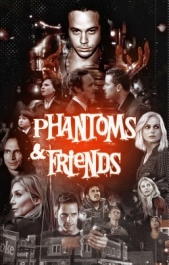Paper Towns

Paper Towns читать книгу онлайн
When Margo Roth Spiegelman beckons Quentin Jacobsen in the middle of the night — dressed like a ninja and plotting an ingenious campaign of revenge — he follows her. Margo's always planned extravagantly, and, until now, she's always planned solo. After a lifetime of loving Margo from afar, things are finally looking up for Q. . until day breaks and she has vanished. Always an enigma, Margo has now become a mystery. But there are clues. And they're for Q. Printz Medalist John Green returns with the trademark brilliant wit and heart-stopping emotional honesty that have inspired a new generation of readers.
Внимание! Книга может содержать контент только для совершеннолетних. Для несовершеннолетних чтение данного контента СТРОГО ЗАПРЕЩЕНО! Если в книге присутствует наличие пропаганды ЛГБТ и другого, запрещенного контента - просьба написать на почту [email protected] для удаления материала
From above, Orlando was pretty well lit. Beneath us I could see the flashing DON’T WALK signs at intersections, and the streetlights running up and down the city in a perfect grid until downtown ended and the winding streets and cul-de-sacs of Orlando’s infinite suburb started.
“It’s beautiful,” I said.
Margo scoffed. “Really? You seriously think so?”
“I mean, well, maybe not,” I said, although it was. When I saw Orlando from an airplane, it looked like a LEGO set sunk into an ocean of green. Here, at night, it looked like a real place — but for the first time a place I could see. As I walked around the conference room, and then through the other offices on the floor, I could see it all: there was school. There was Jefferson Park. There, in the distance, Disney World. There was Wet ’n Wild. There, the 7-Eleven where Margo painted her nails and I fought for breath. It was all here — my whole world, and I could see it just by walking around a building. “It’s more impressive,” I said out loud. “From a distance, I mean. You can’t see the wear on things, you know? You can’t see the rust or the weeds or the paint cracking. You see the place as someone once imagined it.”
“Everything’s uglier close up,” she said.
“Not you,” I answered before thinking better of it.
Her forehead still against the glass, she turned to me and smiled. “Here’s a tip: you’re cute when you’re confident. And less when you’re not.” Before I had a chance to say anything, her eyes went back to the view and she started talking. “Here’s what’s not beautiful about it: from here, you can’t see the rust or the cracked paint or whatever, but you can tell what the place really is. You see how fake it all is. It’s not even hard enough to be made out of plastic. It’s a paper town. I mean look at it, Q: look at all those cul-de-sacs, those streets that turn in on themselves, all the houses that were built to fall apart. All those paper people living in their paper houses, burning the future to stay warm. All the paper kids drinking beer some bum bought for them at the paper convenience store. Everyone demented with the mania of owning things. All the things paper-thin and paper-frail. And all the people, too. I’ve lived here for eighteen years and I have never once in my life come across anyone who cares about anything that matters.”
“I’ll try not to take that personally,” I said. We were both staring into the inky distance, the cul-de-sacs and quarter-acre lots. But her shoulder was against my arm, and the backs of our hands were touching, and although I was not looking at Margo, pressing myself against the glass felt almost like pressing myself against her.
“Sorry,” she said. “Maybe things would have been different for me if I’d been hanging out with you the whole time instead of — ugh. Just, God. I just hate myself so much for even caring about my, quote, friends. I mean, just so you know, it’s not that I am oh-so-upset about Jason. Or Becca. Or even Lacey, although I actually liked her. But it was the last string. It was a lame string, for sure, but it was the one I had left, and every paper girl needs at least one string, right?”
And here is what I said. I said, “You would be welcome at our lunch table tomorrow.”
“That’s sweet,” she answered, her voice trailing off. She turned to me and nodded softly. I smiled. She smiled. I believed the smile. We walked to the stairs and then ran down them. At the bottom of each flight, I jumped off the bottom step and clicked my heels to make her laugh, and she laughed. I thought I was cheering her up. I thought she was cheerable. I thought maybe if I could be confident, something might happen between us.
I was wrong.
7
Sitting in the minivan with the keys in the ignition but the engine not yet started, she asked, “What time do your parents get up, by the way?”
“I don’t know, like, six-fifteen?” It was 3:51. “I mean, we have two-plus hours and we’re through with nine parts.”
“I know, but I saved the most laborious one for last. Anyway, we’ll get it all done. Part Ten — Q’s turn to pick a victim.”
“What?”
“I already picked a punishment. Now you just pick who we’re going to rain our mighty wrath down on.”
“Upon whom we are going to rain our mighty wrath,” I corrected her, and she shook her head in disgust. “And I don’t really have anyone upon whom I want to rain down my wrath,” I said, because in truth I didn’t. I always felt like you had to be important to have enemies. Example: Historically, Germany has had more enemies than Luxembourg. Margo Roth Spiegelman was Germany. And Great Britain. And the United States. And czarist Russia. Me, I’m Luxembourg. Just sitting around, tending sheep, and yodeling.
“What about Chuck?” she asked.
“Hmm,” I said. Chuck Parson waspretty horrible in all those years before he’d been reined in. Aside from the cafeteria conveyor belt debacle, he once grabbed me outside school while I waited for the bus and twisted my arm and kept saying, “Call yourself a faggot.” That was his all-purpose, I-have-a-vocabulary-of-twelve-words-so-don’t-expect-a-wide-variety-of-insults insult. And even though it was ridiculously childish, in the end I had to call myself a faggot, which really annoyed me, because 1. I don’t think that word should ever be used by anyone, let alone me, and 2. As it happens, I am not gay, and furthermore, 3. Chuck Parson made it out like calling yourself a faggot was the ultimate humiliation, even though there’s nothing at all embarrassing about being gay, which I was trying to say while he twisted my arm farther and farther toward my shoulder blade, but he just kept saying, “If you’re so proud of being a faggot, why don’t you admit that you’re a faggot, faggot?”
Clearly, Chuck Parson was no Aristotle when it came to logic. But he was six three, and 270 pounds, which counts for something.
“You could make a case for Chuck,” I acknowledged. And then I turned on the car and started to make my way back toward the interstate. I didn’t know where we were going, but we sure as hell weren’t staying downtown.
“Remember at the Crown School of Dance?” she asked. “I was just thinking about that tonight.”
“Ugh. Yeah.”
“I’m sorry about that, by the way. I have no idea why I went along with him.”
“Yeah. It’s all good,” I said, but remembering the godforsaken Crown School of Dance pissed me off, and I said, “Yeah. Chuck Parson. You know where he lives?”
“I knew I could bring out your vengeful side. He’s in College Park. Get off at Princeton.” I turned onto the interstate entrance ramp and floored it. “Whoa there,” Margo said. “Don’t break the Chrysler.”
In sixth grade, a bunch of kids including Margo and Chuck and me were forced by our parents to take ballroom dancing lessons at the Crown School of Humiliation, Degradation, and Dance. And how it worked was the boys would stand on one side and the girls would stand on the other and then when the teacher told us to, the boys would walk over to the girls and the boy would say, “May I have this dance?” and the girl would say, “You may.” Girls were not allowedto say no. But then one day — we were doing the fox-trot — Chuck Parson convinced every single girl to say no to me. Not anyone else. Just me. So I walked across to Mary Beth Shortz and I said, “May I have this dance?” and she said no. And then I asked another girl, and then another, and then Margo, who also said no, and then another, and then I started to cry.
The only thing worse than getting rejected at dance school is crying about getting rejected at dance school, and the only thing worse than that is going to the dance teacher and saying through your tears, “The girls are saying no to me and they’re not supposedtuh.” So of course I went weeping to the teacher, and I spent the majority of middle school trying to live down that one embarrassing event. So, long story short, Chuck Parson kept me from ever dancing the fox-trot, which doesn’t seem like a particularly horrible thing to do to a sixth-grader. And I wasn’t really pissed about it anymore, or about everything else he’d done to me over the years. But I certainly wasn’t going to lament his suffering.























